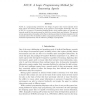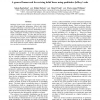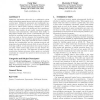102 search results - page 9 / 21 » Modelling Agent Knowledge with Business Rules |
CORR
2004
Springer
13 years 7 months ago
2004
Springer
FLUX is a programming method for the design of agents that reason logically about their actions and sensor information in the presence of incomplete knowledge. The core of FLUX is...
ISMIS
2009
Springer
14 years 2 months ago
2009
Springer
Intelligent agents require methods to revise their epistemic state as they acquire new information. Jeffrey’s rule, which extends conditioning to uncertain inputs, is used to re...
JELIA
2004
Springer
14 years 1 months ago
2004
Springer
Abstract. Often, decision making involves autonomous agents that are structured in a complex hierarchy, representing e.g. authority. Typically the agents share the same body of kno...
ATAL
2005
Springer
14 years 1 months ago
2005
Springer
Multiparty agreements often arise in a multiagent system where autonomous agents interact with each other to achieve a global goal. Multiparty agreements are traditionally represe...
GI
2007
Springer
14 years 1 months ago
2007
Springer
Abstract: Governmental processes are complex and knowledge-intensive. Most process management systems fail to support them in an adequate way. On the other hand semantic technologi...



